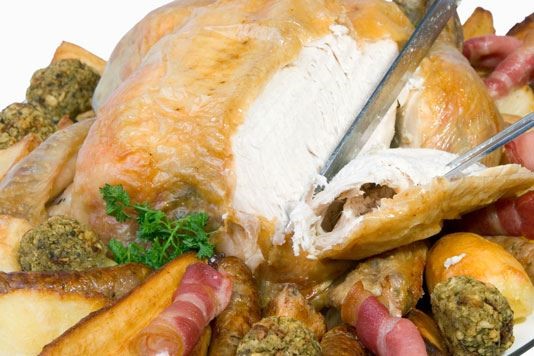
A good stuffing is a key part of any Sunday roast, here's a handy guide to get the most from any additional flavours you put in your bird.
Buying a chicken can be surprisingly complicated because labelling is not entirely straightforward. Cheapest birds can be 10 times less expensive than one at the top of the range, a huge difference. In the UK there is no official body that regulates exactly what a free range chicken is. Allowing the birds outside is a basic requirement, but this can be for as little as one hour a day.
If you want a flavoursome bird that has been reared in humane conditions, make sure the label says it’s free-range, organic or RSPCA Freedom Food. We could also learn a lot from the French. Around 30 years ago the French Ministry of Agriculture developed a production programme for farmers raising free-range chickens. This laid down rules about breed, feed, living conditions and the age of the birds before slaughter. The ministry granted farmers who met their standards the label rouge (red label), which guaranteed that each chicken bearing it was from a slow-growing breed (one with a lifespan about twice that of a factory chicken), had been reared in the open air in groups of limited numbers and had been fed only a natural, cereal-based diet.
The French then went on to produce a category of chicken – poulet de Bresse – of even more exceptional quality. So good was this breed that it gained protected AOC status in 1957.
Stuffing & flavouring chicken
Much of the cooking on our farm centres on tasting the quality of the meat, so I can say with confidence that a good chicken will do all the hard work for you in terms of supplying flavour. That’s not to say, though, that adding a little something is a bad idea.
Aromatics
An onion, lemon or head of garlic cut in half and placed inside the cavity of a bird will moisten the meat from the inside and gently flavour it as it steams. Add a few bay leaves, some thyme or a bunch of tarragon and, with very little effort, you’ve got a delicately scented roast chicken.
Stuffing
Filling the cavity of a chicken with a stuffing of seasoned minced pork, breadcrumbs and a few herbs and flavourings not only helps to add flavour and keep the chicken moist, but also makes the meat go a little further. You’ll need about 450g (1lb) of stuffing for a chicken. Start with 220g (½lb) of minced pork and 115g (4oz) fresh breadcrumbs. Add a finely chopped onion, a minced garlic clove and a reasonable amount of salt and pepper. To this you can add whatever takes your fancy: perhaps mince in the chicken liver and add some finely chopped apricots, dates or grated apple; or add plenty of whatever herbs you have to hand and some grated lemon zest; or add fennel seed sand oregano for an Italian twist; or replace half the minced pork with cooking chorizo or blackpudding for a richer stuffing.
How to stuff a bird
At the neck end, you will find a flap of skin. Carefully push your fingers underneath this, gently working the skin away from the breast. Push about two-thirds of your stuffing mixture into the space you’ve created, then tuck the flap of skin back in or ‘pin’ it with a cocktail stick. At the other end of the bird, just spoon the remaining mixture inside the body cavity. Remember to weigh the bird after it has been stuffed to calculate the correct roasting time.
How to add flavour under the skin
If you’re not stuffing a bird, the easiest way to add extra flavour is to loosen the breast skin as described above, then to push a flavoured butter into the space. Simply add your favourite chopped herbs, aromatics and seasoning to the butter and it will impart their flavour as well as basting the flesh. Please note that this process is neither necessary nor advisable with highquality birds, as the skin contains enough fat to keep the flesh moist, and it would be a shame to hide the flavour of such wonderful meat with gratuitous accompaniments. If you are using a bird with less natural fat and flavour, a seasoned butter mixed with some of the items listed below is very good.
Fresh herbs: chives, lemon thyme, oregano,parsley, tarragon, thyme.
Cured meats: finely chopped pancetta orstreaky bacon, crumbled chorizo or smoked Toulouse sausage, lardo.
Aromatics: celery salt, fennel seeds, garlic, lemon zest, paprika, sundried tomatoes (finely chopped).
Tips taken from The Ginger Pig Farmhouse Cookbook. You can buy a copy and read more samples here.
Portioning a chicken is easy when you know how. It can also save you money too. Here butcher Olly Seabright takes us through how to take apart a chicken.
Andrew Webb meets some fantastic free-range chickens. You can win one (worth £30) as well as a cookery book to go with it, thanks to our friends at The Ginger Pig.
Every chicken recipe of lovefood.com
From Kievs to curry, light bites to how to classics roasts, we've got over 80 recipes for chicken. So what are you waiting for? Get cooking!